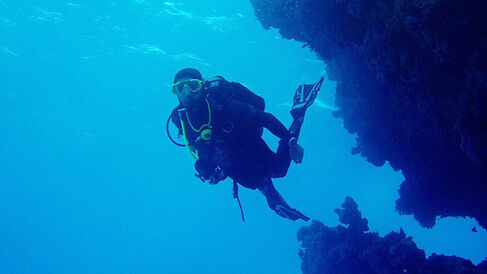
Ross Waller is one of fifteen international scientists to receive an investigator award from the Gordon and Betty Moore Foundation.
The Gordon and Betty Moore Foundation has awarded grants to support the work of fifteen scientists, including Dr Ross Waller from our Department, as part of their Symbiosis in Aquatic Systems Initiative investigator programme. The international cohort will receive five years of unrestricted support to pursue innovative, risky research that has a high potential for significant conceptual and methodological advances in aquatic symbiosis.
Ross is specifically interested in endosymbiosis, which describes two unrelated cells living together, one fully contained within the other. This is the most intimate form of symbiosis, and such relationships have had a profound effect on the development of complex life on Earth. Human cells are the product of such a symbiosis; our ATP-generating mitochondria are the result of ancient symbioses with bacteria. Similarly, photosynthesis in plants is the end product of plant cells' symbioses with cyanobacteria.
Endosymbiosis is not, however, just a process of the ancient past. New endosymbiotic partnerships are continually forming in the environment. And like all relationships, to work, these partnerships require adjustment, compromise, and adaptation from both partners. Genes get relocated between cells, gene control networks must be brought into alignment, and proteins are redistributed between these two otherwise unrelated organisms. Despite their importance, we currently know very little of the global changes that occur within cells as these adaptations towards a harmonious endosymbiosis are formed.
Dinoflagellate algae present several examples of cells at different stages in establishing new endosymbiotic partnerships and, therefore, are excellent models for the study of endosymbiosis. Ross's research will use such cases to describe the global molecular and biochemical changes that occur during different points of this evolutionary pathway, and in so doing will better understand how two cells can learn to live with each other.
The collective research of the Symbiosis in Aquatic Systems Initiative is expected to move the community towards a more comprehensive understanding of the origins, evolution, physiology, ecology, and natural history of aquatic symbioses.
"The investigator awards will serve as a flagship for the Symbiosis in Aquatic Systems Initiative and are expected to push the frontier of aquatic symbiosis research by providing stable and ample support for brilliant scientists who will take risks that drive creative work," said Dr Sara Bender, Program Officer of the Symbiosis in Aquatic Systems Initiative.
In addition, the cohort's research is expected to create a scientific impact greater than the sum of the individual awards because the awardees represent a spectrum of complementary research questions, methods, technologies, and emphasis on either or both marine and freshwater symbiotic associations.
Ross commented that: "The award gives us the freedom to ask large and ambitious questions about the evolutionary changes and adaptations that cells make as they enter into permanent symbiotic relationships. I am excited to interact with the other investigators studying the many types and facets of symbiosis in biology."
The Gordon and Betty Moore Foundation fosters path-breaking scientific discovery, environmental conservation, patient care improvements and preservation of the special character of the Bay Area. Their Symbiosis in Aquatic Systems Initiative, launched in 2019, seeks to advance the understanding of aquatic symbioses that include microbial partners.
